-
 Bitcoin
Bitcoin $106,754.6083
1.33% -
 Ethereum
Ethereum $2,625.8249
3.80% -
 Tether USDt
Tether USDt $1.0001
-0.03% -
 XRP
XRP $2.1891
1.67% -
 BNB
BNB $654.5220
0.66% -
 Solana
Solana $156.9428
7.28% -
 USDC
USDC $0.9998
0.00% -
 Dogecoin
Dogecoin $0.1780
1.14% -
 TRON
TRON $0.2706
-0.16% -
 Cardano
Cardano $0.6470
2.77% -
 Hyperliquid
Hyperliquid $44.6467
10.24% -
 Sui
Sui $3.1128
3.86% -
 Bitcoin Cash
Bitcoin Cash $455.7646
3.00% -
 Chainlink
Chainlink $13.6858
4.08% -
 UNUS SED LEO
UNUS SED LEO $9.2682
0.21% -
 Avalanche
Avalanche $19.7433
3.79% -
 Stellar
Stellar $0.2616
1.64% -
 Toncoin
Toncoin $3.0222
2.19% -
 Shiba Inu
Shiba Inu $0.0...01220
1.49% -
 Hedera
Hedera $0.1580
2.75% -
 Litecoin
Litecoin $87.4964
2.29% -
 Polkadot
Polkadot $3.8958
3.05% -
 Ethena USDe
Ethena USDe $1.0000
-0.04% -
 Monero
Monero $317.2263
0.26% -
 Bitget Token
Bitget Token $4.5985
1.68% -
 Dai
Dai $0.9999
0.00% -
 Pepe
Pepe $0.0...01140
2.44% -
 Uniswap
Uniswap $7.6065
5.29% -
 Pi
Pi $0.6042
-2.00% -
 Aave
Aave $289.6343
6.02%
How to ensure that the generated Bitcoin wallet address is unique?
Bitcoin wallet addresses are uniquely generated via cryptographic hashing of a randomly generated private key, making address duplication astronomically improbable, though using reputable wallets and best practices remains crucial for security.
Mar 11, 2025 at 05:30 pm
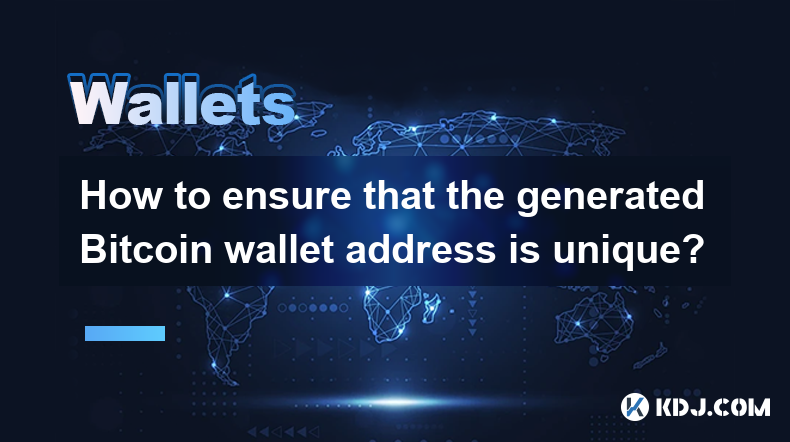
Key Points:
- Bitcoin wallet addresses are generated using cryptographic hashing algorithms, ensuring uniqueness with extremely high probability.
- The process involves private keys, which are randomly generated and kept secret. These keys are mathematically linked to the public address.
- Different wallet software and hardware use slightly different methods but the underlying principle of cryptographic hashing remains the same.
- While theoretically possible, the probability of generating a duplicate address is astronomically low, practically negligible.
- Using reputable wallet providers and following best security practices further minimizes the risk.
How to Ensure That the Generated Bitcoin Wallet Address is Unique?
The uniqueness of a Bitcoin wallet address is paramount for security and functionality. A duplicate address would lead to significant problems, including the potential loss of funds. Fortunately, the system is designed to virtually guarantee uniqueness. This is achieved through the use of sophisticated cryptography and randomness.
The process begins with the generation of a private key. This private key is a long, randomly generated string of numbers. It's crucial to understand that this private key must be kept absolutely secret. Anyone with access to your private key has complete control over your Bitcoin.
This randomly generated private key is then used as input to a cryptographic algorithm, specifically an elliptic curve digital signature algorithm (ECDSA). This algorithm performs complex mathematical operations, transforming the private key into a public key.
The public key is then hashed using a cryptographic hash function, such as SHA-256 or RIPEMD-160. This hashing process creates a much shorter, fixed-length string, which is your Bitcoin wallet address. This address is what you share with others to receive Bitcoin. The hashing algorithm ensures that even a tiny change in the input (the public key) results in a drastically different output (the address).
Different wallet software and hardware wallets use variations on this process, but the fundamental principles remain the same: random private key generation and cryptographic hashing to produce a unique public address. Some wallets may add extra steps for enhanced security or use different algorithms, but the core concept of mathematical uniqueness remains consistent.
The probability of generating a duplicate Bitcoin address is incredibly small. The sheer number of possible private keys is astronomically large, making the chances of collision (generating the same address from two different private keys) practically nonexistent. To put it into perspective, the chance of winning the lottery multiple times in a row is far greater than the probability of generating a duplicate Bitcoin address.
However, this doesn't mean you can be completely careless. Using a reputable wallet provider is essential. Reputable providers implement robust random number generators and rigorous testing to ensure the addresses they generate are unique and secure. Avoid using untrusted or poorly reviewed wallet software, as these may have vulnerabilities that compromise the uniqueness or security of your addresses.
Furthermore, always double-check the address before sending or receiving Bitcoin. A simple typo can send your funds to the wrong address, resulting in irreversible loss.
Steps to Generate a Bitcoin Wallet Address (Conceptual):
- Generate a Random Private Key: This is the core of the process and must be kept entirely secret.
- Derive the Public Key: Apply the ECDSA algorithm to the private key. This is a mathematical transformation, not a simple encoding.
- Hash the Public Key: Use a cryptographic hash function (like SHA-256) to create the Bitcoin address.
- Verify the Address (Optional): Some wallets offer verification steps to confirm the address generation process was successful.
Common Questions:
Q: Can I generate my own Bitcoin wallet address manually?
A: While theoretically possible, it's highly impractical and risky. The mathematical computations involved are complex and require specialized software. Using established wallet software is far safer and more efficient. Manual generation significantly increases the risk of errors, leading to invalid or non-unique addresses.
Q: What happens if I accidentally generate a duplicate Bitcoin address?
A: The likelihood of this happening is exceptionally low. If it somehow did occur, both private keys would control the same funds. The person who controls the private key will be able to spend the funds. This situation would highlight a serious flaw in the underlying cryptography and would likely be widely reported as a major security breach.
Q: Is it safe to use online Bitcoin wallet generators?
A: Proceed with extreme caution. Online generators introduce significant security risks, as your private key might be compromised. It's strongly recommended to use reputable, established wallet software that you download directly from the official source. Online generators are generally not trustworthy and should be avoided.
Q: How often should I generate new Bitcoin wallet addresses?
A: It's a good practice to use a fresh address for each transaction to enhance privacy and security. Many wallets automatically generate a new address for each incoming payment. This helps to protect your privacy by preventing linking multiple transactions to a single identity. Always double check the address before sending or receiving any bitcoin.
Q: If the probability of generating a duplicate address is so low, why is uniqueness still important?
A: Even though the probability is extremely small, the consequences of a duplicate address are severe. It could lead to the loss of funds and would represent a fundamental failure of the system. The importance of uniqueness isn't just about the statistical improbability; it's about the catastrophic consequences of failure. The system is designed to make the probability of failure astronomically low.
Disclaimer:info@kdj.com
The information provided is not trading advice. kdj.com does not assume any responsibility for any investments made based on the information provided in this article. Cryptocurrencies are highly volatile and it is highly recommended that you invest with caution after thorough research!
If you believe that the content used on this website infringes your copyright, please contact us immediately (info@kdj.com) and we will delete it promptly.
- 2025-W Uncirculated American Gold Eagle and Dr. Vera Rubin Quarter Mark New Products
- 2025-06-13 06:25:13
- Ruvi AI (RVU) Leverages Blockchain and Artificial Intelligence to Disrupt Marketing, Entertainment, and Finance
- 2025-06-13 07:05:12
- H100 Group AB Raises 101 Million SEK (Approximately $10.6 Million) to Bolster Bitcoin Reserves
- 2025-06-13 06:25:13
- Galaxy Digital CEO Mike Novogratz Says Bitcoin Will Replace Gold and Go to $1,000,000
- 2025-06-13 06:45:13
- Trust Wallet Token (TWT) Price Drops 5.7% as RWA Integration Plans Ignite Excitement
- 2025-06-13 06:45:13
- Ethereum (ETH) Is in the Second Phase of a Three-Stage Market Cycle
- 2025-06-13 07:25:13
Related knowledge
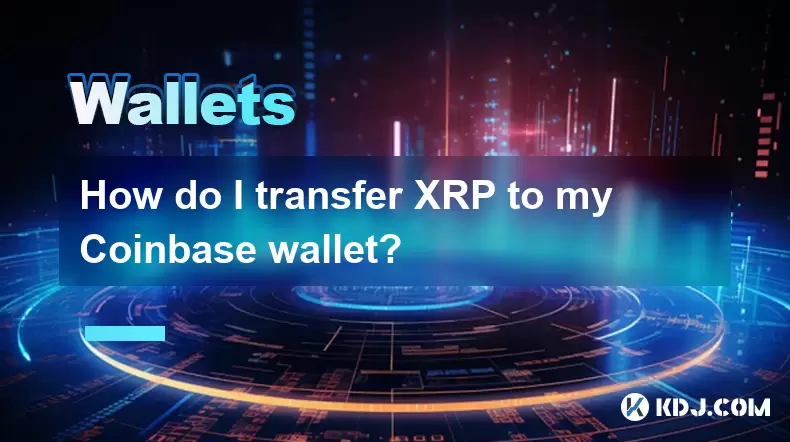
How do I transfer XRP to my Coinbase wallet?
Jun 16,2025 at 04:57pm
Understanding the Basics of XRP and Coinbase CompatibilityBefore initiating any transfer, it’s essential to confirm whether Coinbase supports XRP. As of recent updates, Coinbase has resumed offering XRP trading services on its platform after a period of uncertainty due to legal issues involving Ripple Labs. However, availability may vary depending on yo...

How do I deposit BNB into my Trust Wallet?
Jun 15,2025 at 03:56pm
Understanding BNB and Trust Wallet CompatibilityBefore initiating a deposit, it’s crucial to understand what BNB is and how it interacts with Trust Wallet. BNB (Binance Coin) is a utility token created by the Binance exchange. It can be used for paying transaction fees, participating in token sales, and more. Trust Wallet, on the other hand, is a mobile...
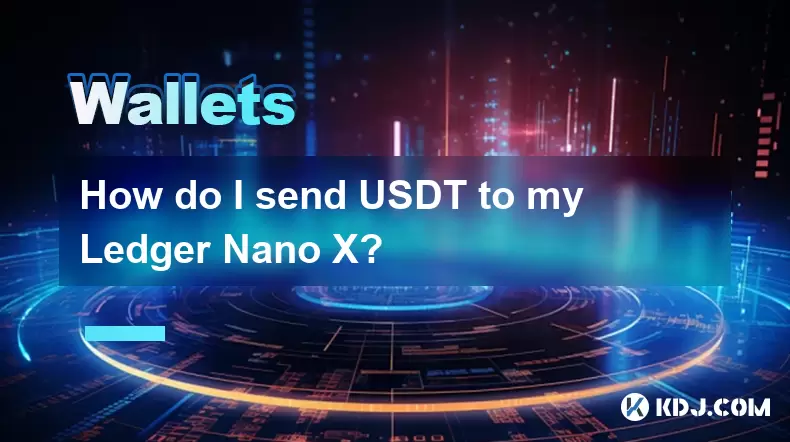
How do I send USDT to my Ledger Nano X?
Jun 15,2025 at 06:28am
What is USDT and Why Use Ledger Nano X?USDT, also known as Tether, is one of the most widely used stablecoins in the cryptocurrency ecosystem. It operates on various blockchain networks such as Ethereum (ERC-20), Tron (TRC-20), and others, offering users a digital asset pegged 1:1 to the US dollar. When it comes to storing USDT securely, hardware wallet...
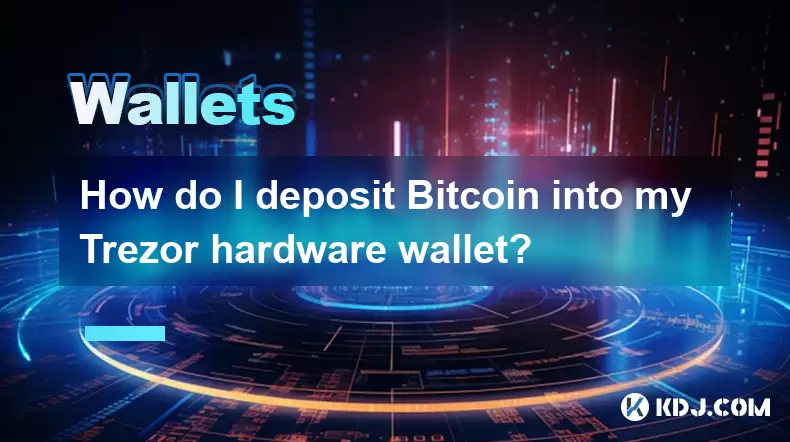
How do I deposit Bitcoin into my Trezor hardware wallet?
Jun 14,2025 at 12:29pm
What is a Trezor Hardware Wallet?A Trezor hardware wallet is a secure device designed to store cryptocurrencies offline, protecting them from online threats. Unlike software wallets, which are vulnerable to hacking and malware, Trezor stores private keys on the physical device itself. This ensures that transactions can only be approved by physically int...
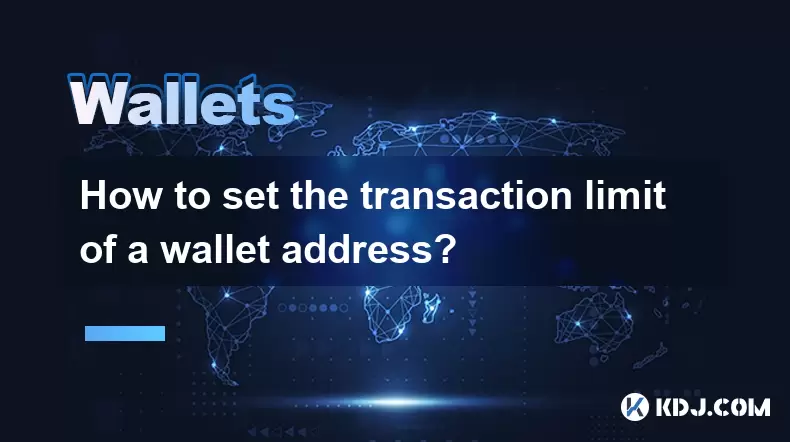
How to set the transaction limit of a wallet address?
Jun 16,2025 at 04:08am
Understanding the Concept of Transaction Limits in Cryptocurrency WalletsIn the cryptocurrency ecosystem, transaction limits refer to predefined restrictions placed on the amount of digital assets that can be sent or received by a wallet address within a specified timeframe. These limits are typically enforced by platforms such as exchanges, custodial w...
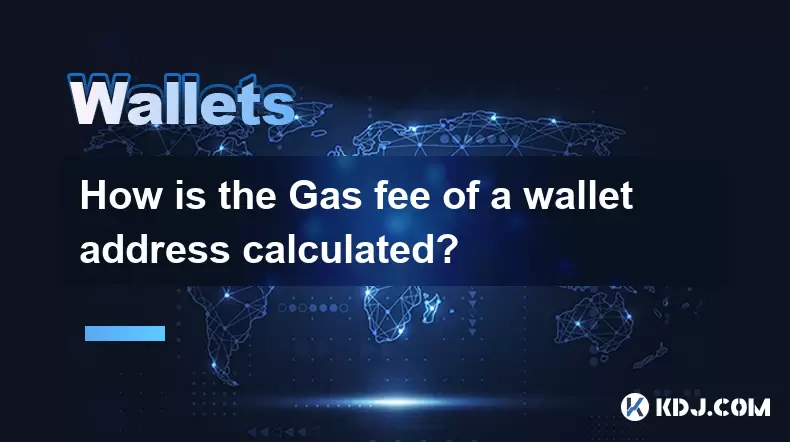
How is the Gas fee of a wallet address calculated?
Jun 14,2025 at 07:57pm
Understanding the Basics of Gas Fees in Blockchain TransactionsIn the cryptocurrency ecosystem, particularly within Ethereum-based networks, a Gas fee is an essential component of executing transactions or smart contract operations. The Gas fee serves as compensation for miners or validators who process and confirm transactions on the blockchain. It is ...

How do I transfer XRP to my Coinbase wallet?
Jun 16,2025 at 04:57pm
Understanding the Basics of XRP and Coinbase CompatibilityBefore initiating any transfer, it’s essential to confirm whether Coinbase supports XRP. As of recent updates, Coinbase has resumed offering XRP trading services on its platform after a period of uncertainty due to legal issues involving Ripple Labs. However, availability may vary depending on yo...

How do I deposit BNB into my Trust Wallet?
Jun 15,2025 at 03:56pm
Understanding BNB and Trust Wallet CompatibilityBefore initiating a deposit, it’s crucial to understand what BNB is and how it interacts with Trust Wallet. BNB (Binance Coin) is a utility token created by the Binance exchange. It can be used for paying transaction fees, participating in token sales, and more. Trust Wallet, on the other hand, is a mobile...

How do I send USDT to my Ledger Nano X?
Jun 15,2025 at 06:28am
What is USDT and Why Use Ledger Nano X?USDT, also known as Tether, is one of the most widely used stablecoins in the cryptocurrency ecosystem. It operates on various blockchain networks such as Ethereum (ERC-20), Tron (TRC-20), and others, offering users a digital asset pegged 1:1 to the US dollar. When it comes to storing USDT securely, hardware wallet...

How do I deposit Bitcoin into my Trezor hardware wallet?
Jun 14,2025 at 12:29pm
What is a Trezor Hardware Wallet?A Trezor hardware wallet is a secure device designed to store cryptocurrencies offline, protecting them from online threats. Unlike software wallets, which are vulnerable to hacking and malware, Trezor stores private keys on the physical device itself. This ensures that transactions can only be approved by physically int...

How to set the transaction limit of a wallet address?
Jun 16,2025 at 04:08am
Understanding the Concept of Transaction Limits in Cryptocurrency WalletsIn the cryptocurrency ecosystem, transaction limits refer to predefined restrictions placed on the amount of digital assets that can be sent or received by a wallet address within a specified timeframe. These limits are typically enforced by platforms such as exchanges, custodial w...

How is the Gas fee of a wallet address calculated?
Jun 14,2025 at 07:57pm
Understanding the Basics of Gas Fees in Blockchain TransactionsIn the cryptocurrency ecosystem, particularly within Ethereum-based networks, a Gas fee is an essential component of executing transactions or smart contract operations. The Gas fee serves as compensation for miners or validators who process and confirm transactions on the blockchain. It is ...
See all articles

























































































